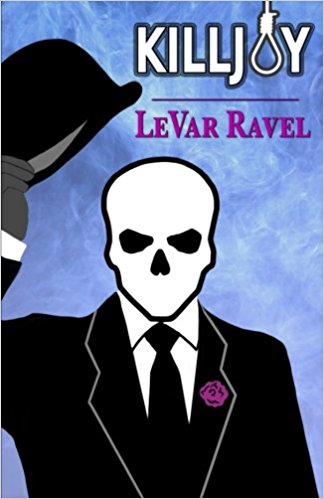 ****I received a free copy of this book in exchange for an honest review **** “Killjoy” is, on the surface, a short tale about an assassin who makes all his victims appear to have committed suicide, leaving those who hire him completely blameless in their deaths. But beneath those themes of revenge, murder, and intrigue surrounding “how does he do it?”, is a lesson about enjoying life and living the life YOU want to live to its fullest, not one that others have dictated is “proper”. For the majority of the story, we are following Gwen, the wife of a prominent mob figure, as she interacts with the jovial assassin (who delights in donning new persona’s and as many overtly fake accents as he can manage) and comes to terms with the complicated feelings she has for Corbin Locke, the politician who is marked for death. Normally, quick reads are perfect for this type of story, but I found myself needing, and wanting, a bit more from Ravel in order to become more immersed in the story he presents. Chiefly, I felt as if the character development for the main characters, Gwen, her husband Charles, Corbin, and the assassin, were overly rushed and therefore a bit stereotypical in their simplicity. The motivations didn’t feel all that genuine, though Gwen does begin to redeem herself closer to the end of the novel and we begin to understand just why she is so strict and ridged, but it just comes too late in the book for me to really enjoy her as a character.
I really liked the flamboyancy that Ravel has created for his assassin. I enjoyed his child like joy and the way he mocked characters like Charles without the others really catching on. I would have really liked for Ravel to spend more time on this character, showing us how he worked, what he really got out of his profession, rather than telling us of his deeds after the fact. I know that is supposed to deepen the mystery but, again, without it, the story felt overly short and it lessened (perhaps marginally so) the impact of the ending moral. It was also a bit hard to really believe Gwen and her husband’s Puritan organization as a legitimate crime syndicate. Given their strict adherence to Puritan principles, it felt far too at odds with their criminal lifestyle. I mean, strict Puritans are almost violently nonviolent so the idea of them running this kind of business and dealing in poisons was kind of a stretch. But, as Ravel does not focus on their business outside of the very, very basics, it’s really only distracting in the beginning and then became easier to overlook as the story went on. Still, a bit more set up and explanation as to how an organization that shuns violence and material objects got to be in their position would have been welcome! Ravel has a lovely way of presenting the moral of his story, the hints and subtly felt organic and were very well presented. I just wanted more! A bit more set up for the characters, more introspection so we got into their heads, would have really created a holistic world and more well-rounded characters. Sometimes, you’re never really sure whose head you’re in as, on more than a few occasions, Ravel mixes character POV’s in a way that can be a little jarring as it switches from one person to the next almost mid-sentence or writes dialogue that doesn’t really fit for the characters he’s introduced. But with how fun the assassin was and how uncomfortable he made everyone else, coupled with the lovely writing, and overarching moral to the book, I enjoyed it! Had this been the second in a series featuring these characters, where perhaps they were introduced more in an earlier book, this would have been a perfect book in many, many ways. That’s also why I’m giving it 4 stars instead of 5, but I am definitely looking forward to reading more of Ravel’s work!
0 Comments
Leave a Reply. |
Click the book images to see them on Amazon!
Categories
All
|






 RSS Feed
RSS Feed



















